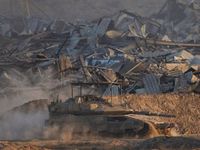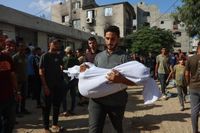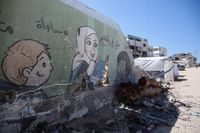As the Israeli military intensifies its campaign in Gaza, new diplomatic efforts and mounting international outrage are converging on what many global leaders and organizations now openly describe as a genocide against the Palestinian people. In the past week alone, the death toll in Gaza has climbed precipitously, with the enclave’s health authorities reporting at least 84 Palestinians killed and 338 wounded in just 24 hours, including 17 shot while seeking desperately needed aid. The humanitarian crisis, already dire, is deepening with each passing day.
On September 4, 2025, Indonesia’s Minister of Culture met with his Palestinian counterpart, Imad Abdullah Saleem Hamdan, on the sidelines of the international CHANDI 2025 forum in Bali. According to ANTARA, the Indonesian minister did not mince words: “What is happening is not just a genocide against a nation, but also a genocide against its culture and civilization. The destruction of infrastructure, historical sites, cultural spaces, and community centers in Palestine reflects a systematic attempt to weaken the culture.” He further affirmed Indonesia’s unwavering commitment to supporting Palestine’s struggle for sovereignty and independence, pledging active contributions through political, diplomatic, and humanitarian channels.
This commitment was formalized with the signing of a letter of intent on culture, paving the way for a host of joint initiatives. These include organizing an international forum spotlighting the cultural genocide in Gaza, promoting Palestinian cultural products in Indonesia, and launching cultural exchange programs—such as a Palestinian culture week and the translation and publication of Palestinian literature. The Indonesian minister stressed the power of cultural diplomacy to foster understanding and solidarity, expressing hope that such cooperation would help keep Palestine’s memory alive in the global consciousness. “We will work with the Palestinian ambassador to address technical matters for implementing the cooperation,” he said. Minister Hamdan, for his part, praised Indonesia for “unwaveringly portraying Israel’s invasion as a genocide and a systematic attempt to undermine Palestinian culture.” He added, “They are trying to erase our culture, but our identity will always persist. Support from Indonesia is crucial to maintaining the existence of Palestinian culture.”
Meanwhile, the violence in Gaza has only escalated. According to Al Jazeera and Reuters, at least 73 Palestinians were killed on September 3, 2025, with 43 deaths in Gaza City alone. Israeli forces have targeted densely populated areas, deploying over 100 explosive-laden robots in Gaza City over the last three weeks, flattening entire neighborhoods. Gaza’s media office reports that approximately 1,100 Palestinians have been killed in Gaza City since August 13. The situation on the ground was described by Al Jazeera’s Hani Mahmoud as “apocalyptic,” with entire neighborhoods “being erased block by block.”
Hamas has called upon the United Nations and the international community to intervene immediately to stop what it calls Israel’s genocide in Gaza. In a recent statement, the group reiterated its willingness to accept a comprehensive ceasefire and to release all Israeli captives in exchange for Palestinian prisoners. However, Israel’s Prime Minister’s Office responded that “the war can end immediately on the conditions set by the cabinet,” namely the release of all Israeli captives and the disarmament of Hamas. Despite mediation efforts, including by Qatar, Israel has yet to agree to the latest ceasefire proposals accepted by Hamas.
The humanitarian toll is staggering. Gaza’s Health Ministry reported six more deaths from famine and malnutrition in the 24 hours prior to September 3, bringing the total to 367 Palestinians, including 131 children, who have died from hunger-related causes since the blockade began. UNICEF has issued a stark warning: 132,000 children under five are at risk of dying from acute malnutrition by mid-2026, with over 320,000 Palestinian children facing severe hunger. Aid workers describe a daily struggle for survival as the blockade continues to choke off food and medical supplies.
Displacement has reached catastrophic levels. The UN recorded more than 82,000 new cases of forced displacement in Gaza between August 14 and 31, with about a million people at risk of being displaced by Israel’s current operation to seize Gaza City. The enclave’s 2.3 million residents have been uprooted multiple times, and those fleeing to southern Gaza face overcrowded camps and soaring prices for basic goods. “The beach is crowded. Everywhere is crowded. There’s no hygiene. It’s a struggle to get water and food,” said Iman el-Naya, a displaced resident interviewed by the Associated Press.
International condemnation is growing. Several European countries—among them France, Britain, Belgium, Canada, and Australia—are expected to formally recognize a Palestinian state at the upcoming UN General Assembly. Spain’s Prime Minister Pedro Sanchez, the first European leader to label Israel’s actions as genocide, criticized Europe’s response as a “failure” that has damaged its credibility. In Scotland, First Minister John Swinney announced a halt to public funding for arms companies supplying Israel, urging the UK government to suspend its trade agreement with Israel. The United Arab Emirates warned that Israel’s potential annexation of the occupied West Bank would cross a “red line” and threaten the Abraham Accords, reiterating its support for a Palestinian state.
Resistance to Israel’s policies is also mounting in academia and civil society. Utrecht University in the Netherlands declared an academic boycott of Israeli institutions over “genocidal policies” in Gaza, with Rector Wilco Hazeleger stating, “We will not start new collaborations with Israeli parties. A boycott is in place until further notice.” In the UK, former Labour leader Jeremy Corbyn launched a public Gaza Tribunal to investigate alleged British complicity in the conflict, vowing, “We will uncover the full scale of British complicity in genocide – and we will bring about justice for the people of Palestine.”
On the diplomatic front, Israeli President Isaac Herzog met Pope Leo XIV at the Vatican to discuss the release of captives, combating anti-Semitism, and protecting Christian communities in the Middle East. The Vatican clarified that Herzog had requested the meeting, and that it is standard practice to grant such requests. Pope Leo XIV has repeatedly called for an immediate ceasefire, the release of captives, and an end to Israel’s “collective punishment” of Palestinians. The late Pope Francis had previously described Israel’s actions in Gaza as “immoral” and disproportionate, demanding an investigation into whether they amount to genocide.
As the world watches, Gaza’s agony continues to reverberate far beyond its borders, reshaping alliances, spurring new forms of resistance, and forcing a reckoning over the cost of inaction. The struggle to preserve Palestinian life and culture now stands at the crossroads of international diplomacy, humanitarian urgency, and the enduring hope for justice.



